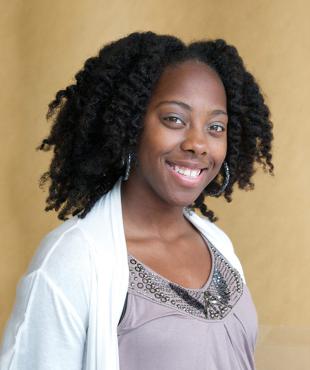
Margaret Marion
In her youth, Margaret Marion never considered becoming a social worker.
“I had this vision of social workers as people who work for DCFS and take you away from your parents,” Margaret explains.
But in reality, Margaret could not have been better suited to the job. As a teenager she worked with the Black Caucus Foundation as a youth ambassador. She and her fellow ambassadors would go to tobacco vendors and gas stations around her native Detroit to conduct annual compliance checks with the Youth Tobacco Act. They would attempt to buy cigarettes and document the vendors that sold to them without asking for identification. They wrote reports that resulted in the citations of non-compliant vendors. And in true social service fashion, they would return six months later, in disguises, to determine if there had been any changes for the better.
“I think our goal was a 12 percent improvement in the number of businesses selling tobacco to young people,” Margaret notes. “I think we came in just under that, but it was good to see the change.”
After growing up in neighborhoods devastated by substance abuse, Margaret arrived at the University of Chicago in 2008 as an undergraduate English major. She switched to a human development major in hope of finding her studies more personally meaningful. Many of her readings for class, plus her volunteer work at the University Community Service Center, changed Margaret’s view of social workers and opened the door to a fulfilling career. Soon she began investigating graduate programs in social work, and quickly decided on Crown Family School because it offers a core curriculum that allows students to become familiar with the history of the profession, current theories and approaches, and its direction for the future. Also, the opportunity to take classes in policy and other related areas is something that was not available in many of the competing programs.
“The hardest decision I had to make when I was applying for the AB/AM program was whether to become an administrative or clinical student,” Margaret says. “I understood that whichever track I chose, I would still have room to pursue classes in the other track that fit in with my academic and professional goals. Ultimately, I chose clinical because of its concentration in alcohol and substance abuse.”
During her time at Crown Family School, Margaret completed her second-year field placement in the counseling office of United Neighborhood Association Major P. Hector Garcia MD Charter School in Archer Heights.
“This placement offered me great freedom and guidance in the construction of my roles and responsibilities,” she explains. “My field experiences were closely connected with my core coursework. My major assignments were based on understanding the agency context and how the core concepts and values of the profession unfold, or don’t, in an agency setting. Combining these experiences helped in understanding the profession.”
After graduating, Margaret had the opportunity to work as a full-time school counselor where she had completed her first year field placement in the UNO Charter School Network. In her work at the charter school, Margaret continued to notice and advocate against injustices experienced by her students, their parents, and her coworkers. She assumed a leadership role unionizing efforts which bargained for the public good, such as resources in the classroom and anti-racist practices.
In her next career move, Margaret worked for La Rabida Children’s Hospital in Chicago, completing in-depth clinical assessments after youth were separated from their parents due to egregious abuse or neglect. From the assessments, Margaret made treatment recommendations to the courtroom, as well as suggestions towards reunification. Margaret reports that her clinical knowledge increased tremendously within this position, though she remained concerned about how systems of power significantly impacted people’s ability to recover from traumatic life circumstances, and disproportionately so, people of color.
Margaret currently works full-time for Youth Guidance in the Working on Womanhood (WOW) program. The curriculum for this program is being studied by UChicago Crime Labs. She is placed in a southwest high school, where she conducts individual and group therapy with young women.
“I love this job not only because the kids are great, but also because there’s a sense among the staff that we are building this program together,” she says. “We learn from each other; it’s been a dynamic experience.”
Through her career thus far, Margaret feels that Crown Family School taught her the incredible value in questioning and critical thinking in her work.
“I never want to lose sight of the bigger picture, and at the same time I never want to lump kids together as all the same. At Crown Family School, I learned it’s necessary to keep a lens on the outer realm while still building relationships on the micro scale. All of these experiences in my career so far have solidified for me the importance of constantly adjusting my lens,” she explains. “I love my work, even if I’m not doing AOD (alcohol and other drugs) treatment directly, as I had planned. I continue to ask questions about power and structure at the institutional level as well as interactions at the day-to-day level. I’m always thinking about what we can do better.”